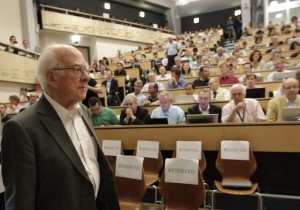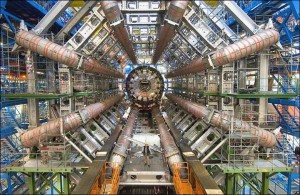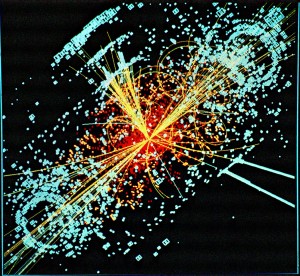
Physicist Peter Higgs arrives at a seminar, July 4, 2012 at CERN, where it was announced that a new subatomic particle, said be consistent with the long-sought Higgs boson, had been discovered. (AP)
Last summer, when scientists finally cornered the elusive building block of the universe known as the Higgs boson, they apparently also discovered something else: that the universe’s days might be numbered.
“It may be that the universe we live in is inherently unstable,” said Joseph Lykken, a theoretical physicist from the U.S. Department of Energy’s Fermi National Accelerator Laboratory. “And at some point, billions of years from now, it’s all going to get wiped out,”
Scientists refer to last year’s discovery as a Higgs boson-like particle, since they’re still working to confirm it really is the elusive particle. The Higgs boson, also called the “God particle”, is believed to give all objects mass. But Lykken says it could also spell doom for the universe.
Lykken shared his conclusions at the 2013 meeting of the American Association for the Advancement of Science. The scientist has also worked with CERN’s Large Hadron Collider (LHC), the world’s biggest and most powerful particle accelerator, which helped identify the Higgs boson-like particle.”If you use all the physics that we know now and you do what you think is a straightforward calculation, it’s bad news,” said Lykken, according to the Reuters news agency.
The calculation Lykken refers to requires knowing the mass of the Higgs to within one percent, as well as the precise mass of other related subatomic particles.
According to Lykeen if any changes are made to the parameters of the Standard Model of particle physics, even by just a little bit, that you’ll get a different end of the universe.
“This calculation tells you that many tens of billions of years from now, there’ll be a catastrophe,” Lykken told Reuters.
The Standard Model of particle physics provides an explanation for sub-nuclear physics and some aspects of cosmology in the earliest moments of the universe. In the standard model, it’s the Higgs boson that gives mass to all particles.
Lykken foresees the Armageddon scenario like this, “A little bubble of what you might think of as an ‘alternative’ universe will appear somewhere and then it will expand out and destroy us.”
He believes the cataclysmic event will take place quite quickly, at the speed of light.
The good news for planet Earth is that the end of the universe won’t occur for billions of years, long after the Sun burns out, an occurence which will destroy Earth long before the universe’s number is up.























The famous physicist and NASA Chief, Robert Jastrow said, “For the scientist who has lived by his faith in the power of reason, the story ends like a bad dream. He has scaled the mountain of ignorance; he is about to conquer the highest peak; as he pulls himself over the final rock, he is greeted by a band of theologians who have been sitting there for centuries.”
The apostle peter many centuries ago said, ” Looking for and hasting unto the coming of the day of God, wherein the heavens being on fire shall be dissolved, and the elements shall melt with fervent heat…”
Guess Jastrow was right after all. There is still time to make peace with God before that day.
what is it most likely to do to the universe. what about Nibiru
First, I seriously doubt that the apostle Paul (or anyone of his time) would even understand this prediction let alone recognize its fortuitous relationship to his own prediction.
Now to the science. Since dark energy is causing the universe to expand at an exponentially growing rate so that expansion exceeds the speed of light (the speed limit only applying to travel in space, not the expansion of space), then it seems like any instability that expands through space at the speed of light will never be able to destroy/replace more than a tiny part of the current universe. So the universe will survive indefinitely, merely budding off new universes. Even if it were to replace the existing universe with a new one, that is good news rather than bad news because it would reset entropy and allow a new “living” universe to replace a “dead” one. Therefore, no terrible “Armageddon” but merely a cosmic “cycle of life”.
What Donald Firesmith says. Yeah. Totally agree.
I agree with one caveat actually. If the instability … the “little bubble [of an] ‘alternative’ universe” … travels through the universe at the speed of light then it certainly could destroy the _contents_ of the universe even if your assertion that the speed of light is a cosmic speed limit (but not an _intercosmic_ speed limit) is true. However it does seem that it would replace a cold, dead universe with a living one. Interesting consideration, though it is rather meaningless to humanity as it exists today, being dependent on the Sun and Earth for its very existence.
And this is news how? What was before the big bang? probably another universe that expanded and eventually collapsed into a singularity, which caused the big bang. Why should the cycle not repeat itself, as many other events repeat themselves?
Dark energy causes ever accelerating expansion of the universe and thus doomed the cyclic Big Bang Big Crunch theory. This ever increasing expansion will eventually over power all other forces and rip galaxy clusters, then galaxies, then stellar systems, then stars, then molecules, atoms, and even particles apart. This is why child universes budding off will never destroy all of the parent universe. Of course by then, the parent universe will have long ago died an entropy death so that its partial destruction by child universes won’t matter as nothing will be around to care.
If the god particle gives other particles their mass that might offer a way around the light speed limit. Not sure, more of a generalist, than someone specializing in the field.
“tens of billions of years from now, there’ll be a catastrophe,” What is this catastrophe exactly? All matter disolving into nothingness?
A lot seems leftout here.
This theory is known as The Big-Crush, where all the micro and macro-universe will become one: The atomic and subatomic particles will disperse their orbits will be no more atoms… Is more or less like.
I feel, as a physics educator, that talking of such a long-long and unimaginable time will make an adverse effect on the public. Already, the popularity of physics is in deep trouble, evident in the motive for celebrating the year 2005 as the I.Y.P. in the name Albert Einstein.